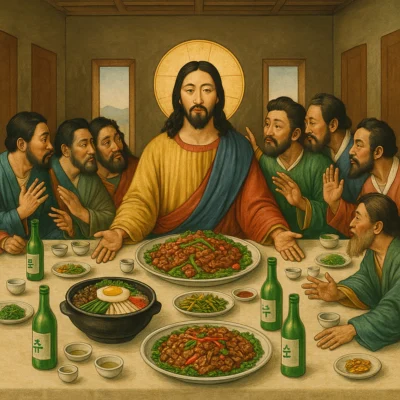You might have heard that there’s a significant amount of Christians in Korea. Indeed, approximately 30% of Koreans define themselves as Christians, making it the biggest religion in Korea. More than two thirds of them are Protestant and the rest are Catholic. Christianity is followed by Buddhism while atheism, a modern religion founded don’t know where and by whom, is the biggest one – surpassing the sum of all these.
If you’re into (history of) mythology, you know that religions are modified according to the culture. In Turkey, for example, we believe in an Islam which by far doesn’t resemble the Islam of Arabs, the founders of the religion. Likewise Buddhism in Korea is different than that of, let’s say, Himalayas, India, or Tibet – it wouldn’t survive if it wasn’t localised.
I urge you to take a look at the photo below if you thought that Christianity was an exemption from this universal rule:

Yeah, he indeed is Jesus – but not the one you and I know. He’s the Korean version of it.
Long story short, when the first missionaries arrived at Korea, they found a land dominated by local(ised) religions like Confucianism, Taoism, or Buddhism. Decade after the other did flocks of missionaries arrive to the land, yet they all failed because they couldn’t answer questions like “where is this Jesuralem that you’re talking about”, “who are the Jews”, or “we are reborn, not resurrect from the dead. What are you talking about”. In the end the Pope, tired of all these unsuccessful attempts even by the best of his men, gave special permission for the missionaries to localise the religion, not wholly but partially, and make them damn Koreans understand the one and only true religion.
So, what did this last flock of missionaries tell, how did they succeed in their mission?
Let me tell you a bit. Jesus was called Jesus no more but Pshi-yeo. He was born in Saro and his ministry took place during the reign of Namhae, during early Three Kingdoms period. He travelled around the peninsula extensively, visiting then Busan thrice, and crusified later in Goguryeo, the northern kingdom. Of the twelve apostles, seven were Korean, four were Chinese and one Japanese – you can guess, I believe, where Judas Iscariot was from. Also it still is a hot topic if bulgogi or bibimbap was served in his last supper.
He resurrected from the dead than being reborn in another body, for gods realized three days later that his death was earlier than planned. Yeah, pagan gods aren’t smart enough. Having finished his ministry, Jesus, or Pshi-yeo, not having anything better to do, left for Baekje, the third and the smallest kingdom, got married and had three children, naming them me, I, and myself, and spent the rest of his days as a carpenter fixing usual and insignificant village stuff.
When the Koreans are told this version of events, they finally managed to understand Jesus, hence his teachings, and started becoming Christian. The rest of the Holy Bible, thankfully, was not needed to be localised as you can see below:

A fun fact before finishing this chapter: In Korea you’ll hear shipshiyo all around and it means please. When you divide the word, you’ll find that it is made of shi Pshi-yeo – for (shi) Jesus (Pshi-yeo) just like por favor in Spanish.

